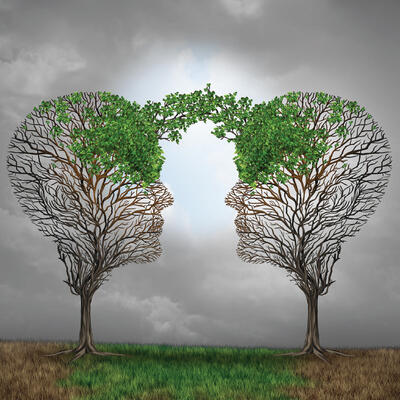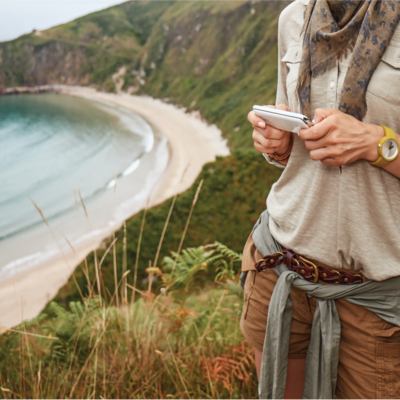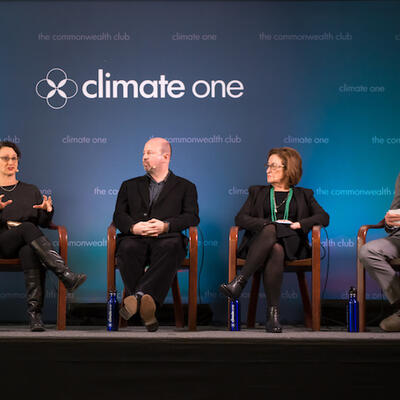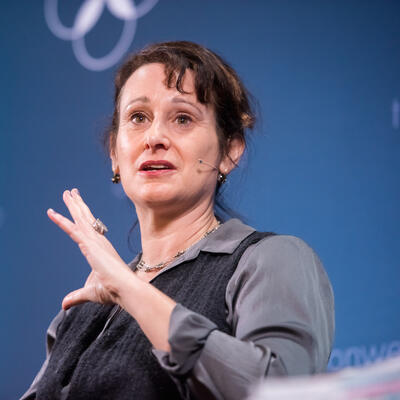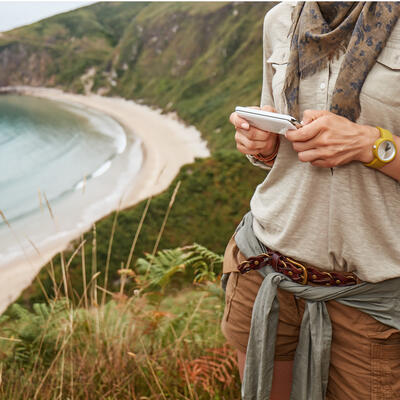
REWIND: Exploring Climate Psychology / Getting Outside in the Digital Age
Guests

Leslie Davenport
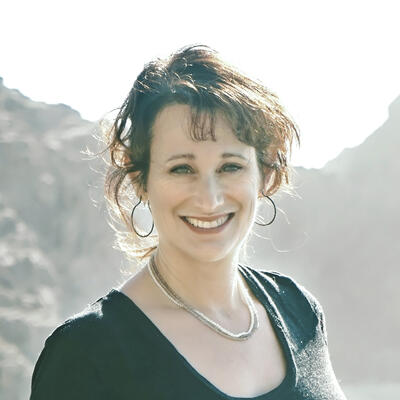
Renee Lertzman
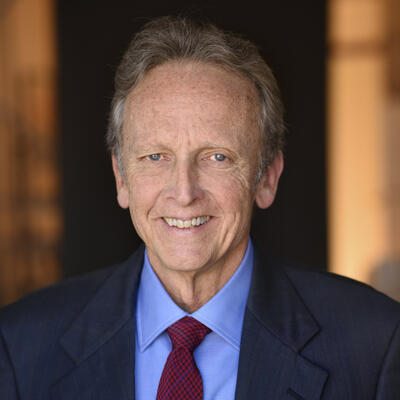
Bryant Welch
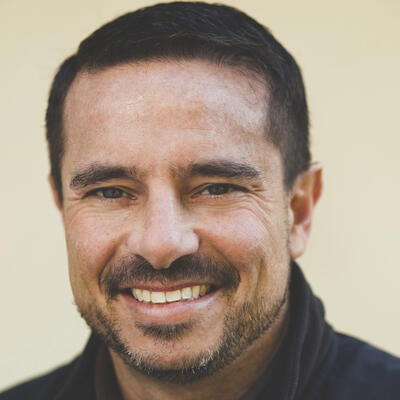
Phil Ginsburg
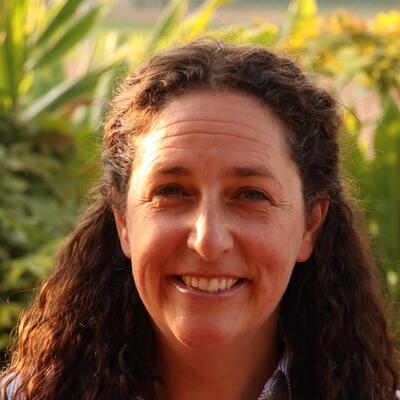
Rebecca Johnson
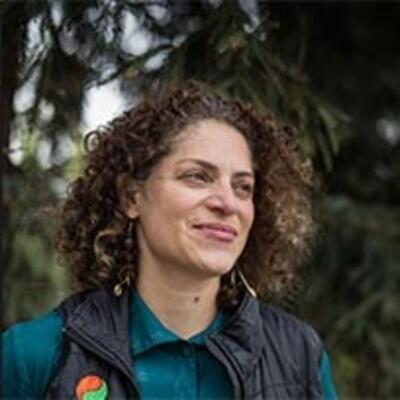
Nooshin Razani
Summary
We all know about the environmental and physical effects of climate change. But what about its impact on our mental health? According to some psychologists, their patients who report trouble sleeping, changes in appetite, feelings of dread or hopelessness, could be suffering from climate anxiety.
“I’m starting to notice in my practice that sometimes people come in with ambient anxiety,” reports clinical psychotherapist Leslie Davenport. “They’re just more distressed, even if they haven't always connected the dots about why.”
Davenport likens her patients’ feelings about climate change to the five stages of grief.
“Really what we're talking about is any kind of loss,” she says. “Loss of identity, loss of lifestyle, loss of environment…the degradation we’re talking about can trigger a very similar process.
There are ways to cope with stress and depression brought on by climate change. One very simple form of therapy? Close the laptop, turn off your phone and get into nature. Research has shown that all the benefits engaging more deeply with nature are enhanced when people leave their screens behind.
“If you take an urban person and you put them in the forest, within a few minutes you’ll see improvement in heart rate in blood pressure,” says Nooshin Razani, Director of the Center for Nature and Health at UCSF Benioff Children’s Hospital Oakland. “Around 20 minutes you’ll see improvements in attention span…[within] 90 minutes they've shown that depression goes down.”
As General Manager of San Francisco’s Parks Department, Phil Ginsburg has made it his mission to ensure that every child has a nature-based experience every day. “The generation of children that are growing up today is the most sedentary generation of kids in our history,” he laments. “The impact to mental health, the impact on creativity, relationship building – all these things happen easier in nature without a phone.”
Like Razani, Ginsburg works with underserved communities to ensure that the city’s park system is more equitable and inviting to an increasingly urbanized population. “Nature is not about the once a year trip to Yosemite or to Glacier [National Park],” Ginsburg emphasizes, “nature is in your city, it’s in your backyard, it’s where we are.”
Part One of this program was recorded in front of a live audience at The Commonwealth Club in San Francisco on November 29, 2018, and originally aired on December 16, 2018.
Part Two was recorded at the Commonwealth Club in San Francisco on March 15,2019, and originally aired on March 22, 2019.
Related Links:
Emotional Resiliency in the Era of Climate Change: A Clinician’s Guide (Leslie Davenport)
Environmental Melancholia: Psychoanalytic Dimensions of Engagement (Renee Lertzman)
State of Confusion: Political Manipulation and the Assault on the American Mind (Bryant Welch)
iNaturalist – A Community for Naturalists
Center for Nature and Health at UCSF Benioff Children’s Hospital
David Strayer: Restore Your Brain with Nature (TEDx)
San Francisco Cities Teen Outdoor Experience
Full Transcript
Greg Dalton: This is Climate One, changing the conversation about energy, the economy, and the environment.
If you are having trouble sleeping, experiencing changes in appetite, or feeling hopeless, you could be suffering from climate anxiety.
Leslie Davenport: I’m starting to notice in my practice that sometimes people come in with ambient anxiety they’re just more distressed even if they haven't always connected the dots about why. [:13]
Greg Dalton: There are ways to cope with stress and depression brought on by climate change. One very simple form of therapy? Close the laptop, turn off your phone and get into nature.
Nooshin Razani: Within a few minutes you’ll see improvements in heart rate and blood pressure... Around 20 minutes you’ll see improvements in attention span... After an hour you’ll see more physical activity... 90 minutes they've shown that depression goes down. [:15]
Greg Dalton: Exploring Climate Psychology and Getting Outside in the Digital Age. Up next on Climate One.
---
Greg Dalton: Is climate change stressing you out?
Climate One conversations feature oil companies and environmentalists, Republicans and Democrats, the exciting and the scary aspects of the climate challenge. I’m Greg Dalton.
On today’s show, we revisit two discussions from last year about maintaining our well-being in the face of a destabilized climate.
Lise Van Susteren: Whether we know it or not, whether we like it or not, whether we accept it or not, everyone is now engaged in some form or has some form of climate anxiety.
Greg Dalton: One way to cope with depression, as many studies show, is to spend time reconnecting with the natural world. Just remember to leave your screens at home.
Phil Ginsburg: The impact to mental health, the impact on creativity, relationship building, all these things happen easier in nature without a phone.[:08]
Greg Dalton: But these days, many people, especially children, are disconnected from nature. Access to the great outdoors - or even a park to run and play in - isn’t always readily available to underserved communities.
Nooshin Razani: If every child is going to have a nature experience then every child needs to have a tree near them. And so we can’t have all the trees and all the green in one part of town and not in another part of town.
Greg Dalton: Later on, we’ll revisit a Climate One discussion about finding ways to bring people to nature, and vice-versa. But first, we talk with three experts on climate psychology. Clinical psychologist Leslie Davenport likens her patients’ feelings about global warming to the five stages of grief.
Leslie Davenport: Denial, anger, sadness, bargaining have its versions of what it might look like in the climate world…really what we're talking about is any kind of loss. Loss of identity, loss of lifestyle, loss of environmental...can trigger a very similar process. [:20]
Greg Dalton: Davenport is the author of Emotional Resiliency in the Era of Climate Change: A Clinician’s Guide. She works as a clinical psychotherapist in San Francisco and Tacoma, Washington. Renee Lertzman is a Climate Engagement Strategist and author of the book Environmental Melancholia: Psychoanalytic Dimensions of Engagement. And Bryant Welch is a clinical psychologist and the author of State of Confusion: Political Manipulation and the Assault on the American Mind.
Even those of us who care deeply about climate change can find it difficult to bring up the topic in conversation. Renee Lertzman explains why.
---
Renee Lertzman: It's an incredibly challenging topic to talk about because our feelings, our investment in the issue run so high. It’s urgent, it's time sensitivity, has all those attributes that make it incredibly difficult to talk about in a productive way. And so what I've learned over years of studying with all kinds of clinicians and motivational interviewers is that the key I think to talking about climate change is to recognize and tune in to what the others might be feeling and thinking. And so it really is more about the quality of how we show up and how we invite the other to reflect and speak to whatever it is they might be experiencing about the issue. And learn how to hold off on pushing our own anxiety and sense of emergency on to the other which will often be what the person is mainly responding to and then you get into these charged dynamics.
So the first thing I say is, you know, it’s really about listening, but I don't want to minimize what that really means. There’s an internal process so it’s how do we enter into these interactions whether you’re a company or whether you're an individual or organization. How can we have compassionate ways of communicating about climate and I think that being able to tune in and listen and reflect and bringing that quality of again just a sort of an acceptance which paradoxically, I think leads people into entering the topic in a new and different way.
Greg Dalton: Right. And so Leslie Davenport, often there's this impulse to talking about climate to persuade or convince people. To jam a fact or an idea down someone's throat and, you know, I need to convert you right now.
Leslie Davenport: Yes.
Greg Dalton: Has that work?
Leslie Davenport: No, it’s reminding me of that saying that smashing heads won't open minds. It’s about opening to new possibilities new ways of thinking. One thing I wanna add is that, you know, not everyone that we’re gonna engage with is on the same place the same level of receptivity. When I was bringing innovative programs into a medical setting I learned that there was sort of a group of people that no matter what just weren't interested weren’t listening. There was the ones who agreed totally with the new programming and then there was this really fertile middleground; people who didn't quite know about it or maybe a little skeptical, curious, less familiar.
And that just was a really rich area to work with and that's where a lot of the, you know, the success could be felt of people kind of awakening to it rather than kind of necessarily going for those that just had really closed and latched the door to possibilities.
Greg Dalton: Right. And according to the Yale Six Americas studies of American public opinion only 9% to 10% of Americans are just basically never gonna accept it. There's a big persuadable middle that you can connect with it might be through technology, not climate, but there's food, there's ways to connect with people where they are.
Bryant Welch, you talk about disassociation and how things people -- is a defensive mechanism that when there's trauma people disassociate from something that they feel is uncomfortable or painful. How does that apply to climate?
Bryant Welch: Well, I think to support what Renee and Leslie are saying. It really helps if you’re gonna talk to another mind to understand a little bit about the mind. And if you look at the American mind as I have over the last 20 years it’s stunning how much it's deteriorated.
I can see that my need to persuade this audience is limited. But if you want to do just a quick test. I did write a book 10 years ago when I talked about this and to kind of take a look at it and wrote pretty much the same book only applied to now. If you want to have a quick litmus test of how the American mind has changed and I'm not saying this to be facile. Picture George W. Bush and then picture Donald Trump. Now I was appalled at George Bush and the way in which the American mind was responding at that time. But now we get Donald Trump and so if you look at what's happened to the mind, you know, we all feel that the environment has been neglected. I think that's probably a safe assumption in this group, but let me tell you nothing’s been as neglected as the American mind. The mind is a very limited instrument to begin with. We've done unbelievable things to it just like we've done to the environment. And we now have skilled political manipulators who are experts at making us crazier and crazier.
So in terms of we have got to understand the mind if we’re gonna get a rational decision out of it. So I think when you talk about listening to people and connecting with their mind and I think what you're talking about is making a connection with a person which eases their anxiety unbelievably. If you listen to them you connect with them. Once you connect with them people are in such desperate shape they’ll get dependent on anything. They got dependent on Donald Trump because he was offering them some profound experience. So I totally agree with you but I think there is a bigger issue it’s not just the environment. Our kids are not safe to go to school it’s a very, you know, we had a second amendment and we can't figure out a way to keep guns out of school. So my argument is that we have to all of these issues have to we have to be looking at the American mind itself because it's really been abused over the last 20, 25 years in a number of ways.
Greg Dalton: And we’ll talk later a little bit about how climate is a symptom of some broader things and connected to other things. You mentioned anxiety, Lise Van Susteren is a Washington DC psychologist who specializes on how people feel about the future of climate impacts.
Lise Van Susteren: Pre-traumatic stress disorder is a subset of climate anxiety. There is a subset of people who are very focused on future harm and have intrusive thoughts about it and may have had seen their moods and thoughts affected by it. And sometimes they might know they’re anxious but they don't know why. And they will say they can't sleep or they’re sleeping too much. They’ve lost their appetite or they've gained weight. Certainly the angry outbursts the fears the ongoing feeling of dread of hopelessness these are all signs. When we think about future injuries to future generations there's a fear that is generated and this is a profoundly distressing state. I have no doubt now, especially considering recent events, whether we know it or not, whether we like it or not, whether we accept it or not everyone is now engaged in some form or has some form of climate anxiety.
Greg Dalton: Lise Van Susteren a Washington DC psychologist. Leslie Davenport, is that true do you agree that everyone has some level of climate anxiety whether they realize it or not?
Leslie Davenport: Yeah exactly that’s the thing whether they realize it or not. I’m starting to notice in my practice that sometimes people come in with ambient anxiety they’re just more distressed even if they haven't always connected the dots about why. And that's what I'm trying to do is also introduce it more into the mental health field to bring those questions in and help people see where that is. You know and related to this, you know, it feels like all of you who are here are here because of your interest in this already. And that as we learn how to talk about it more effectively I just want to introduce the idea that all of us can take a leadership role in whatever sphere of influence your life lives in. We don't all have to write books we don't all have to sit up on a stage but if we’re looking --
Greg Dalton: Or march in a march.
Leslie Davenport: Or march in a march which is wonderful and I do that too. But yeah, to redefine what is leadership and to redefine what is advocacy that if you're responding and looking through the lens of we are interconnected and I stand for a just and sustainable future. How will that influence the words that come out of your mouth and the things that you choose to do and the lifestyle you choose to lead. And that will be a guide that that can very powerfully ripple out in a lot of directions.
Renee Lertzman: I wanna -- can I follow on that?
Greg Dalton: Renee Lertzman.
Renee Lertzman: I think that what you're saying relates to are we all, is everyone experiencing eco-anxiety. What I've noticed is the tendency for those who are very engaged and concerned is to have a perception or an assumption that a lot of people don't care because if they did care more then they would be doing what I'm doing which is coming to events like this and doing the various things we try to do. And I think that’s a very, it’s an inaccurate assumption that for a lot of people this is sort of in that like you said an ambient kind of anxiety.
And I think one of the most powerful ways we can express the leadership that I think you're talking about is by sparking different kinds of interactions and conversations in our lives to create the context where we have permission to go there to name to talk about. I mean evidence-based psychology supports the fact that having conversations and interactions is the driving force for behavior change. And so when people say to me well that all sounds great Renee, we don't have time to have conversations that sounds very kind of not scalable --
Greg Dalton: We don’t need talk. We need action.
Renee Lertzman: Yeah exactly. It makes zero sense to me. For one thing, humans are social beings and we are interacting all the time in our organizations, our schools, our churches our social media whatever, we are interactive social beings. The quality of that interaction makes all the difference. And if more of us were skilled and tuned into how to do that more effectively and again I think it comes back to compassionate communication even if you're running a political campaign. It can be empathetic and it can be compassionate, which I think relates to Bryant’s work, right, which is the lack of that gross kind of generalization not to be too simplistic has led to what we’re seeing which is that there's this fear and anxiety that’s just been simmering under the surface. Well what if we actually start communicating in a more skillful way.
Bryant Welch: You know I think it is astonishing, I mean it’s startling. I've been doing psychotherapy now for 40 plus years. And I'm always, it's a constantly renewing realization that when people are listened to it is a very unusual experience for them and a very powerful experience for them. And the human connection that comes from that is being torn asunder all across our society. You know, families are broken up, there are now more children who grow up missing one of their biological parents than grow up with both parents. And so the dissociation, disconnection, and ultimately the dehumanization that results from that is astonishing. And it's not just anxiety and trauma a lot of it has happened, you know, I think Renee more than anyone opened my awareness to, you know, to the environmental melancholia with the -- look at what's happened in Green Bay in terms of environmental deterioration it's depression; there is loss. And when you connect with someone in these kinds of conversations that environmentalists are now talking about. I think very, very wisely, it is stunning the impact it has on the person being listened to. And what you all are doing for me right now is wonderful.
Renee Lertzman: Exactly. And I think that we need to learn how to listen; that these are skills we can actually be supporting and cultivating in ourselves. I mean HuffPo did a listening tour around the country last summer I think. I went out and did a training with them. What struck me is very odd because they were journalists and I would’ve thought okay, that’s what they do but they actually we need support to learn how to listen, especially in such charged, you know, environments.
Greg Dalton: But we live in a culture of avoidance, you know, take a pill, distract yourself don't feel that grief or pain. So I want you, Leslie Davenport, to tell us about the climate grief cycle. The five stages of climate grief that you write about.
Leslie Davenport: Well, first I just want to clarify that sometimes when we think about grief because some of the early models like with Elisabeth Kübler-Ross, were developed around when someone dies. And that really what we're talking about is any kind of loss. Loss of identity, loss of lifestyle, loss of environmental, you know, the degradation we’re talking about can trigger a very similar process. And so I was overlaying what that looks like when it relates to struggling with the losses that are around climate change. And truthfully it's less important to look at the stages as it is to recognize that there is a purposefulness to the feelings; there's a sanctity to pain. It's kind of like if there's a pain in our body it’s telling us something that we need to attend to. If a signal light comes on in our car it’s saying, hey look something is going on here. And as you were saying, in our culture we tend to shut down and want to erase the pain and not that we want to reside there but we need to recognize what's the message which helps us move through these different ways that it shows that. And so, you know, denial, anger, sadness, bargaining have its versions of what it might look like in the climate world. But the most important part is underneath that making room for the emotional landscape that accompanies this experience so that we can attend to what's happening with more of ourselves instead of investing so much energy at keeping the feelings at bay.
---
Greg Dalton: You’re listening to a Climate One conversation about exploring climate psychology. Coming up, helping children take charge of their feelings.
Renee Lertzman: I think it's vital that we really work on the narrative around look, no matter who you are and where you are, you know, you absolutely have a role to play. [:09]
Greg Dalton: That’s up next, when Climate One continues.
---
Greg Dalton: This is Climate One. I’m Greg Dalton, and we’re talking about ways to cope with our anxieties about climate change. My guests are climate engagement strategist Renee Lertzman and clinical psychologists Leslie Davenport and Bryant Welch.
Changes that threaten their world can be especially scary for children. Many of us find it hard to look young people in the eye and tell them everything will be okay, when we’re not so sure ourselves. Lesley Davenport says the best approach is to be direct and authentic.
---
Leslie Davenport: The main thing I would say I don't feel like I have the answers to all of that I think we’re discovering that as we go. But this idea of building resiliency in from early, early on, luckily there are some schools starting to include things like mindfulness programs are becoming much more common. Not necessarily all around the environmental issues but just that capacity to be present with thoughts and feelings as they arise rather than just being sucked into them. The earlier those are learned, the easier it is to build that and rely on that more consistently. So that’s certainly a step in the right direction.
Greg Dalton: Mindfulness and yeah, those going on.
Leslie Davenport: And -- sorry, just one other thing. Just in general in psychotherapy and psychology. Whenever there is helplessness, hopelessness, one of the antidotes is to empower toward being active toward change towards the things you want. So there are child versions of doing that too and I think to infuse that in that it's not just information it’s not just coping but it's how to translate that on a child level.
Renee Lertzman: And I would just add that one way I’ve thought about this is the frame or the narrative that we as humans are figuring out how to be humans and how to live on the planet and we haven't always gotten things right. And here we are and we have, I mean that’s kind of my, that’s basically my interpretation of our ecological climate crisis is we didn't intend for this to happen; that we made a lot of progress there’s been a lot of benefits we've learned a lot. And now we’ve discovered that this isn’t really working too well and now we've got this opportunity to do what humans do so well, which is to grow and create and innovate and have ingenuity and, you know, to really highlight that this is -- and Kim Stanley Robinson, author, I heard him speak about this a few years ago. Where he goes even further and says to especially young people, youth, you know, this is your opportunity to make history and you know, inviting people into a narrative where we’re part of something bigger. But it depends on the developmental stage but I really love the kind of like hey, you know, as humans we’re figuring it out and you’re part of that, right. So again it’s inviting people and all of us into this story because the other danger about, you know, with young people on the kind of projection onto people like Jane Goodall and, you know, they're out there doing that they’re the eco-heroes. Here I am in Minnesota whatever and some small town and what can I possibly do.
I think it's vital that we really work on the narrative around look, no matter who you are and where you are, you know, you absolutely have a role to play and it's up to you, you know, only you really know what that is and to invite that kind of reflection on what we can, but again not being like oh every little thing like we have to, it’s a very fine line between that kind of narrative and, you know, being kind of right and simplistic about it.
Greg Dalton: I bought a Prius, I’m good I’m done. Okay, yeah, I addressed my conscience. Are you sincerely hopeful Leslie that we’ll surmount this challenge?
Leslie Davenport: My hope lies in being more and more aware as I get older of how much I don't know. There have been so many points in my life where I was sure about something that I've been proven wrong that that keeps me very open to possibility. I do find it daunting because I track the science pretty closely. So I am happily with the jury that’s still out and want to be very much part of the story.
One thing I like that Renee said, you know, sometimes in discussions like this there's a certain segment that says oh, you know, the earth will be just fine, we’re just gonna eject all the humans. But I think evolution is more elegant than that. I think humans are part of this and evolutionarily speaking for a kind of purpose and that we are still figuring it out. And with that there’s an investment in the hope of what might be possible.
Renee Lertzman: Can I just add two quick things.
Greg Dalton: Sure. Renee Lertzman.
Renee Lertzman: One is the tendency we have to be very binary or dualistic. We tend to ping pong between the optimism and the hope and the despair. In actuality we I think intuitively we know that that's not real, right that it's much more complicated than that. And I'd love to see us supporting one another and really holding that place that’s sort of in between. The other thing I wanna say based on, you know, following on what you said is I want us to acknowledge that at the same time that we’re learning more about our ecological impacts and climate crisis, we are also experiencing a tremendous revolution of insight into the minds.
I mean it's phenomenal so neuroscience and trauma studies and attachment theory and contemplative practices are exploding motivational interviewing I’ve been doing a training here in the city that's changed my whole outlook. There is no excuse for the climate and environmental community to not be mining and exploiting these resources as actively as we can. I think there's such an opportunity to be partnering between these areas of expertise. Not that we all have to go out and become experts in the psychology, but it's really exciting to me to see how that field is growing and presents this opportunity for new kinds of collaboration and synthesis and creativity.
Bryant Welch: I totally agree. You know the thing we got going for us in this is the very act of awareness is a corrective therapeutic act. And I just think all these things that are encouraging us to be aware and that's a word that we use every day. But when you look at what neuroscientists are doing with the concept of awareness now, you know, there's a saying, if you can name it you can tame it. Now there’s a lot of optimism in that. And it really does produce health, mental health in and of itself. So I really think we've got 50% or 60% of the variance is right there in that discovery. And so I've never been more optimistic. I don't know if we’re gonna survive. But I’ve never been more optimistic.
---
Greg Dalton: We’ve been exploring the psychology of climate volatility on Climate One. My guests for this half of the show were climate engagement strategist Renee Lertzman, and psychotherapists Leslie Davenport and Bryant Welch.
We turn now to the great outdoors, with three experts who joined us on the Climate One stage last year.
Phil Ginsburg is General Manager with the San Francisco Recreation and Parks Department, and was recently appointed Commissioner of the California State Park and Recreation Commission. Rebecca Johnson is co-director of citizen science at the California Academy of Sciences. And Nooshin Razani is Director of the Center for Nature and Health at Children’s Hospital in Oakland, California.
All three maintain that reconnecting with nature, one way or another, is essential to both mental and physical health. it’s vital to combating the stress and anxiety that our tech-heavy lives foster - especially in young people. Phil Ginsburg sees how many kids are balancing screens and physical activity in the tech mecca of San Francisco
---
Phil Ginsburg: So let’s start with the, you know, sort of some of the hard reality here, which is the generation of children that are growing up today is the most sedentary generation of kids in our history. It's the first generation that whose life expectancy is probably less than their parents and that stuff about screen time is very true. On average, kids are spending somewhere between five and eight hours a day on their screen and less than an hour a day outside. Not a great recipe. More optimistically, particularly here in the Bay Area we are blessed with incredible open space within city limits of San Francisco, 18% of our city is green space. 18%, that's pretty good and San Francisco is the first city in the United States of America where 100% of us live within a ten-minute walk of a park.
So we have access and I think you know under two or three different mayors who've cared a great deal about this we've invested $500 to $600 million in our park system to try to make it more equitable, more welcoming. And I think we’re doing a pretty good job of that but we have a big culture shift to ensure that every child has the opportunity to enjoy nature every day. And that is what we should all be working on every child should have a nature-based experience every single day.
Greg Dalton: Not just go to a park one week in the summer sort of thing. Nooshin Razani you deal with an underserved population in Oakland that doesn't have the access and has some of the same generational things Phil talked about, sedentary screens, etc. So talk about reaching that underserved population at your work.
Nooshin Razani: I think that it’s important to clarify that while there is absolutely a difference in who has access to nature, and sadly nature is like many other commodities in our society it’s inequitably distributed, that does not reflect whether or not people want to be in nature. And we've spent a lot of time talking to and studying and being with the patient served that Children's Hospital Oakland who happened to the majority are on public insurance such as a marker of being near federal poverty line. And definitely people still want to be in nature and so lack of access is not a marker for whether or not people want nature.
And so I think when you're talking about how to make people have that desire, which I think is what you’re kind of getting to, I usually try to start with folks where their at. And so in a family that has multiple stressors whether if you're living in poverty, you may be working several jobs and this actually applies to all of us. There is so much to do in the modern day that it's really hard to come at a parent and add one more thing on. And so I really don't take that approach that, oh you have to do X, Y and Z in order to maximize your health. I really try to come from a place of you have the right to have this thing in your life that will help you cope with the rest of your life. And you have the right to rest you have the right to spend quality time with each other and let me see if I can help you find that.
And so that’s the approach we take. I think that your point about equity is an important one and so I hope that physicians can join in with people like Phil in parks districts to also advocate for the fact that, you know, if every child is going have a nature experience then every child needs to have a tree near them. And so we can’t have all the trees and all the green in one part of town and not in another part of town but we can all advocate for more equitable distribution of nature.
---
Greg Dalton: You’re listening to a Climate One conversation about combating stress by getting back to nature. Coming up, city kids meet the great outdoors.
Phil Ginsburg: This is a population that probably wouldn't may not flinch at a gunshot, that are used to concrete and asphalt, have seen all kinds of awful stuff that doesn't really scare them very much. And you bring them up to the woods and they just become kids again. [:15]
Greg Dalton: That’s up next, when Climate One continues.
---
Greg Dalton: This is Climate One. I’m Greg Dalton. We’ve been talking about getting outside in the digital age, with Phil Ginsburg of the San Francisco Recreation and Parks Department, Dr. Nooshin Razani of UCSF Children’s Hospital, and Rebecca Johnson of the California Academy of Sciences.
We may think that unplugging from technology is the only way to have a nature experience. But Rebecca Johnson believes that our screens can also be used to help us engage with the world around us - and she’s got an app for that.
---
Rebecca Johnson: So through my work at the California Academy of Sciences where I co-direct citizen science, we design programs and try to work with lots of partners all over the city and the state and the world to figure out ways to connect people to nature and at the same time help them by using this platform called iNaturalist, an app and a website, to make biodiversity observations. And so those observations like speaking as a scientist, those observations are really important for understanding and doing really good science and furthering conservation but at the same time, this tool is a way to connect people to the natural world. And sometimes that sounds a little counterintuitive but people are inherently curious. And having this app and tool that encourages them to be curious and take pictures of what they're seeing whether or not they know what it is and knowing that there’s kind of a space where you can take a picture of a plant and you might not know what it is, but if you take a good enough picture the app and then people online, a community of people, will help you learn what it is, is a way to foster curiosity and at the same time use that tool that can sometimes be really isolating but to connect you to a community of people.
And all of our events and the things that run use this app as a tool but it also has a huge in-person community building. There’s a part of it that is in-person community building. So we bring people together in places that matter to them to help discover and document biodiversity together. And so we bring people together that may not have met but share a love of usually of a place and so they can discover and explore together. It might sometimes be through a screen but usually the screen is kind of helping the experience; it's a little different than just being isolated by the phone in between them.
Greg Dalton: Nooshin Razani, there's a professor at the University of Utah named David Strayer, you referred me to his work I watched his TEDx talk. He’s done research about human brains 20 minutes and science. So tell us about his research and what he's found with people in nature with their phone and without their phone.
Nooshin Razani: Sure. Well, I think in general and this is both the work of David Strayer and many others. If you take an urban person and you put them in the forest within a few minutes you’ll see improvement in stress. And so you’ll see improvements in cortisol in heart rate in blood pressure. Once you get to around 20 minutes you’ll see improvements in attention span after an hour you’ll see more physical activity and then 90 minutes they've shown that depression goes down. And then when you spend even longer time in nature and this is one of the studies that Dr. Strayer did where he actually hooked people up to EEG machines while they were backpacking in the wilderness. They had no technology at all.
Greg Dalton: Except the EEG machine.
Nooshin Razani: That’s so true. But what he found is that there seems to around day three there's a little bit of a tipping point where your creativity is really maximized and your cognitive ability goes up. He has also done another study where he looked at the changes in brain waves in nature and then what if you go into nature with your phone. He did show that some of the benefit went away with the phone. And I think as a pediatrician one thing that I'm also and you brought this up, concerned about is parents and parental distraction. And the fact that the emotional attachment that happens between a parent and a child when a parent actually looks a child in the eye and mirrors their facial expression that whole interaction is key to the emotional development of the child. And so when both parties are fixated on a screen instead of each other there is a loss of actually what is not, you know, what is not optional what is actually essential to the development of a human being, which is having your parent mirror your emotions. And so I think except for iNaturalist, we need to be aware of our, you know, of the fact that we might be missing out on really enjoying nature together if we’re doing it through a screen, yeah.
Greg Dalton: Phil Ginsburg, there are juveniles on probation that go to Yosemite. Tell us about that program.
Phil Ginsburg: We run a really, really great program called the Teen Outdoor Experience. It's a multi-agency partnership, but we manage a property near Hetch Hetchy called Camp Mather, maybe some of you have been there. It is a place where there is no cell service and there is no Wi-Fi, think about that for just a second and it is paradise. And you know picking up on Nooshin’s you know, apt remark about the equitable distribution of opportunities like that it is historically not in a place where we have seen that many people of color and that many people from underserved communities. It's beloved among much of San Francisco but we've made a concerted effort to give kids who don't know about it or wouldn't normally have a chance to get up there to get up there. So the program works with kids who touch our juvenile probation system and it involves the Juvenile Probation Department, the Police Department, Department of Children, Youth and Family and my staff and we bring up every year about 70 kids for about five days.
And what's amazing is that this is a population that probably wouldn't may not flinch at a gunshot that they hear in the city, that are used to concrete and asphalt, have seen all kinds of awful stuff that doesn't really scare them very much. And you bring them up to the woods and they just become kids again. They're scared of the dark, they're scared of water, they’re scared of animal sounds. They have trouble understanding why you can't have a bag of Cheetos in your tent in the woods and a couple had to learn the hard way. And to see this group of kids up there you literally watch this population become kids again. And it speaks to everything anecdotally I’m just relaying everything that Nooshin has evidence about the impact to mental health, the impact on creativity, relationship building all these things happen easier in nature without a phone.
Greg Dalton: Nooshin, I wanna ask you, lot of people struggle with how much to tell children. I remember some eighth-graders coming to me and they did a research project and they're very prepared and they looked at me and I looked at them and they look at me as an authority figure. I didn’t know how much to tell them because I think it's kind of dark but so, you know, how do you talk to a 10-year-old versus a 15-year-old versus someone younger? How do you calibrate what you tell them?
Nooshin Razani: I’ve been thinking about this topic a lot and I've actually been drawing from the research that's done on trauma. There's been research done after 9/11 and after really huge events on how to talk to kids about something very traumatic. Because I don't think we should take it lightly that we’re telling children not only that we foresee the entire change of ecosystem but also that we don't really know what to do about it. I think that we have to do that in a developmentally appropriate way.
What that research around trauma shows is that children do best when they think that they’re part of something and when they have social support and when they know their elders are doing what they can and that they have a story to tell themselves about what's happening. So I think for children 0 to 5, you have to recognize that there’s very little separation between the external world and internal world and their relationship to a tree or an animal is one of intimate love. So you really have to talk about the death of that animal in a way that recognizes that you're telling them something they love will be dying.
As kids get older I think you have to progressively give them more leadership in it. But just to wrap it up with drawing from the literature on trauma, I think the really important thing is to not say the world is ending and it’s up to you to change it. I think like because you’re five and you have no power, right. I think the thing to say is, yes, what you've heard is true and what you see is true and my generation is going to do every single thing that we can. But then we actually have to do everything that we can. And what we don’t get to will be up to you and if you have any ideas I’ll try my best to follow you and your lead. But to not like leave it up to them or not say the world is ending so you should recycle. Like I mean it doesn’t make sense.
Greg Dalton: If you’re just joining us we’re talking about connecting to nature at Climate One. Our guests, Phil Ginsburg, General Manager of the Recreation and Parks Department in San Francisco. Nooshin Razani, Director of the Center for Nature and Health at the Children's Hospital in Oakland, California. And Rebecca Johnson, Citizen Science Lead at the California Academy of Sciences. I'm Greg Dalton.
We’re gonna go to audience questions. Welcome to Climate One.
Female Participant: Hi. This question is for Mr. Ginsburg. So I found your work with the youth at Camp Mather very interesting. Did you see any long-term benefits after they spent such a long period in nature?
Phil Ginsburg: Well the benefits for us are we were able to engage kids in our system that actually have come back year after year. They come back the second year as a pure leader and several kids that have been in that program now actually work for us. So, you know, we weren’t really collecting data on these kids and maybe at some point we should figure out a way to do that. But just the mere fact that we have kids who are still in our system and are now peer leaders and camp counselors is quite good.
Rebecca and Nooshin talked about how do we get kids to sort of - how do we get us all but how do we get our next generation to kind of sort of care about the earth and really have a vested stake in making sure that we have nature and we have parks. And rather than telling kids what they can't do I think we've done a pretty decent job of giving kids an opportunity to learn and grow and actually work in nature.
Greg Dalton: Welcome to Climate One.
Female Participant: Hello. So the earth has always been a changing thing, you know, for centuries it’s always changing. It never stays the same. I think that’s something that's really interesting. But when things like climate come up there is always these issues and I guess this is vague, but this is kind of for all three of you, what would be some things that we’d want to keep the same like as our usage of technology and also balancing it out with like nature what you guys were talking about.
Phil Ginsburg: I could take a stab at a way that technology is actually helping us in water conservation. We now use something called evapo sensors which are, you know, this is basically an Internet 2.0 technology that is actually able to measure the water content in soil so that we can irrigate much more precisely. That's an example of technology being used to help us conserve. And there are probably a few other examples of that but I do think that we have to be open to, you know, building design changes, irrigation techniques change, land management, you know, techniques change with technology. And we have to be open to that as long as we understand what our values are, right. And our values are to try to conserve natural resources to try to respond to some of the impacts of climate change and again in this era of, you know, unfortunately a very sedentary disconnected generation giving the next generation of kids a reason to be outside to form a community.
And I guess kids and parents I mean what Nooshin said about you have to be there to kind of look at your child, I mean that really resonated with me. Because I have a busy job and I spend way too much time on my phone even though I love nature and I’m out in it all the time. I think we have to get back to using our park system to create community. And I do think we should be open to ways that technology invites us to do that.
Rebecca Johnson: I would just add that, you know, even though the work that we do on my team is we use an app and we use technology. I mean it’s all about community. I mean I don’t think I will be in this job or doing this work or care about it nearly as much as if it was just about the technology. I mean it’s really about the people and connecting to people and finding ways to build a community around nature and nature connection for everyone. Everyone who lives in the city, everyone who lives anywhere and helping them use technology to learn more about the nature around them. And to help kind of collectively generate the data that we all need at the scale like global scales to help solve these problems and help understand how biodiversity is changing.
We have global data about climate and a lot of most other variables but biodiversity data is really, really hard to get at that scale. And the only way we can do that is that people everywhere make and share observations. And then the flip like other benefit is that then they’re more connected to nature and hopefully through the work that we do can be more connected to each other wherever they live.
Greg Dalton: Next question, welcome.
Female Participant: So I know that spending a lot of time on screens can be bad for a growing brain which my dad tells me a lot. But can Ms. Razani elaborate on what you said about seeing positive aspects to screen time and how that connects to knowing how much time is spent on screens and how much time to spend outside.
Nooshin Razani: Yeah, so there was a large national study where they looked at screen time in kids and adolescents. And what they found is that there's a huge uptick in number of hours spent on screens at around middle school. And for kids age 14 to 17 sadly, you know, every hour that you’re on a screen does increase your risk of anxiety or depression. And so I think it's real. It does seem that those kids that spend more than seven hours a day, and that's a weekday, on screens tend to have like double the risk of anxiety or depression which may be that kids who are depressed need screens more than other kids.
But I would say that going back in the beginning when I was talking about basically how to live as a human you need 8 to 12 hours of sleep if you’re a teenager it can be up to 12. You need to exercise I mean I can’t even believe that I’m settling for an hour a day but I would settle for an hour a day. And I tell people that you need to be out of doors in the sunshine for an hour a day. And if you think about the human animal, it’s like the only animal that we allow, to only be allowed outside for one hour a day and we find that acceptable. But I think you need to be outside an hour a day, you need to have physical activity and then you should be eating dinner with your family. There should be screen-free zones and screen-free times for families to interact with no screen.
And then, you know, in terms of what to do online, I think there is some data that some of the social networking stuff is more correlated with anxiety and I don't want to speak to that fully. But like instinctively what I think is like when I see my kids creating something or generating content or if they can get good enough to code or actually be in a position of power when they're using the technology as opposed to just a consumer, I feel like that would be better for their mental health.
---
Greg Dalton: We’ve been talking about the benefits of reconnecting with nature on Climate One. I’m Greg Dalton, and my guests were Nooshin Razani, Director of the Center for Nature and Health at UCSF Benioff Children’s Hospital in Oakland. Rebecca Johnson, Co-director of Citizen Science at the California Academy of Sciences. And Phil Ginsburg, General Manager with the San Francisco Recreation and Parks Department.
Earlier in the show we talked with author Renee Lertzman, clinical psychologists Leslie Davenport and Bryant Welch.
To hear more Climate One conversations, subscribe to our podcast wherever you get your pods. Please help us get people talking more about climate by giving us a rating or review.
Greg Dalton: Kelli Pennington directs our audience engagement. Tyler Reed is our producer. Sara-Katherine Coxon is the strategy and content manager. The audio engineers are Mark Kirchner, Justin Norton, and Arnav Gupta. Anny Celsi edited the program. Dr. Gloria Duffy is CEO of The Commonwealth Club of California, where our program originates. [pause] I’m Greg Dalton.
